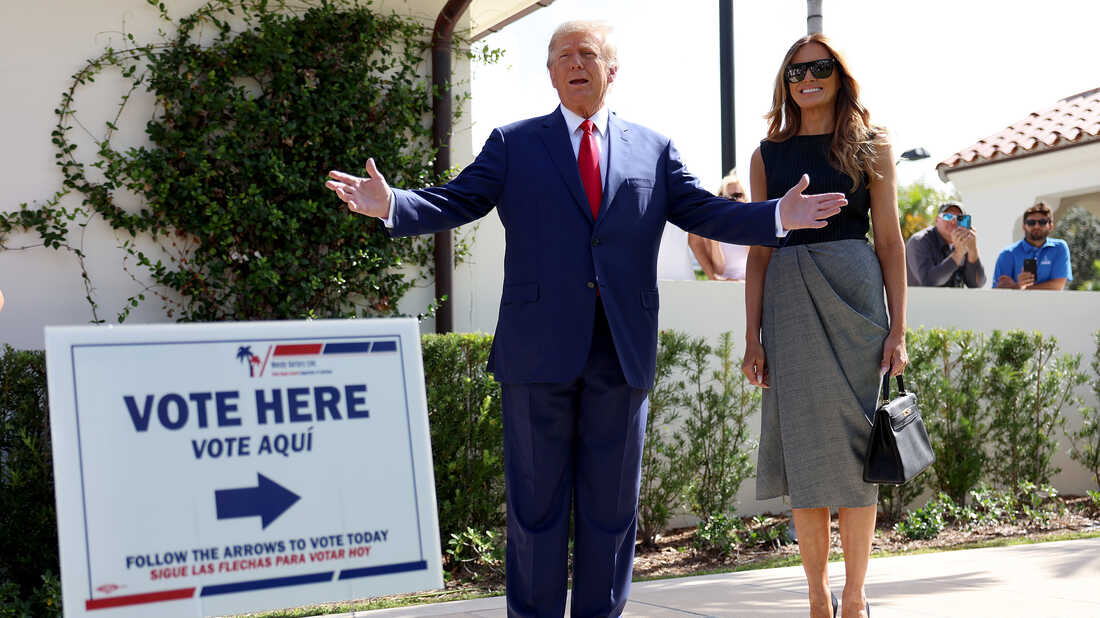Elections
If convicted this year, Trump could lose the right to vote for himself
Former President Donald Trump stands with former first lady Melania Trump after voting in 2022.
Joe Raedle/Getty Images
hide caption
toggle caption
Joe Raedle/Getty Images
Former President Donald Trump stands with former first lady Melania Trump after voting in 2022.
Joe Raedle/Getty Images
Pundits and analysts have spent much of the past year debating the political impact should Donald Trump be convicted before November’s election88 felony charges he faces.
On Monday, jury selection begins for the first 34 of those charges, in New York.
But one unprecedented oddity lost in the mix is that just a single conviction in any of the cases that Trump faces could put his ability to cast a general election ballot for himself at risk.
The cases will play no role in whether Trump can run for federal office, but there’s a real chance they affect whether he can vote in the 2024 race.
Trump has voted in Florida since 2020, and the state,
But even within that group of states that disenfranchise felons, there’s a wide spectrum in terms of how a conviction impacts a person’s right to vote.
Some states automatically restore a person’s voting rights after incarceration; some restore them after a full sentence is complete, which encompasses parole and fines as well; and others require a waiting period or some sort of action on the part of those convicted to get re-registered.
In Florida, for instance, most felons regain their voting rights only after they have completed their sentences, including paying any outstanding fines. So if Trump were convicted in Florida, as he could be in his classified documents case, then he would lose the right to vote until all aspects of his sentence there were complete.
Trump’s situation would be simpler to figure out, say legal experts NPR spoke with, if all the cases were taking place in the same state.
But it’s more complicated, because the first trial he is facing — and the one most likely to be completed before the 2024 election — is the hush money case in New York, where he’s charged with falsifying business documents around the 2016 election. He has pleaded not guilty to every charge he faces.
The New York case could still affect his voting status in the Sunshine State, however, says Justin Levitt, an election law expert at Loyola Marymount University and a former Justice Department official, because Florida essentially honors the disenfranchisement rules of other states.
“Florida has interpreted its statute to say that a felony conviction in another state makes a person ineligible to vote in Florida,” Levitt says. “[But] only if the conviction would make the person ineligible to vote wherever they were convicted.”
New York also restricts the voting rights of people convicted of felonies, but only while they are incarcerated. So Trump could lose his voting rights due to the New York case, but only if he gets convicted and sentenced to prison time.
“I’ll go out on a limb and say that’s not going to happen,” says Levitt.
The former president could theoretically face more than 100 years in prison for the 34 charges he faces in New York, but legal experts including Levitt say that this is highly unlikely because of the nature of the charges.
“If it was already extremely unlikely that even if convicted he’d see prison time for this set of offenses [in New York], then I would say the former president’s status makes it extremely, extremely, extremely, extremely unlikely,” Levitt says. He added that the other trials Trump faces present a higher likelihood of affecting his right to vote.
If Trump were convicted in the Georgia election interference case, he would lose his right to vote in Florida immediately because Georgia law says a person only needs to be convicted to lose voting rights (and those rights wouldn’t be returned until the completion of sentencing).
A conviction in the election interference case that Trump faces in Washington, D.C., federal court would seem not to impact his voting rights, however, because the District of Columbia does not disenfranchise people with felonies.
If nothing else, says Michael Morley, a law professor at Florida State University, wading through the murkiness of Trump’s eligibility shows how confusing it is for people with prior convictions, as well as those facing trial in a state other than the one they vote in, to figure out whether they can cast a ballot.
Local election officials aren’t notified of felony convictions that happen in other states, and reporting has shown that people who have been convicted in the past can sometimes inadvertently break the law and vote because they think they are eligible when they aren’t.
“That seems like something that can raise difficulties,” Morley says.
